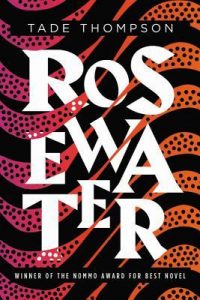What I’m Reading: “Rosewater” by Tade Thompson
 Last week, I discussed Tade Thompson’s Rosewater in the context of a post on Framing The Book. I also mentioned that I had enjoyed reading the book and encourage readers to do likewise, if only to better grok my remarks around “framing.”
Last week, I discussed Tade Thompson’s Rosewater in the context of a post on Framing The Book. I also mentioned that I had enjoyed reading the book and encourage readers to do likewise, if only to better grok my remarks around “framing.”
Fair’s fair, though, I thought (during the course of the past week), I should really provide a little more context about the book and why I enjoyed it. 🙂
Rosewater, which won the Arthur C Clarke Award in 2019, is a science fiction novel by UK writer, Tade Thompson. Mr Thompson is of Yoruba Nigerian descent and the novel is set in a near-future Nigeria, spanning a period from ca. 2032 – 2066. Rosewater is the name of a township that has grown up around an alien biodome. The main character, Kaaro, is a “sensitive”, or telepath, ostensibly freelancing to provide psychic security for banks and businesses. He is also an operative for the Nigerian security services.
In the best science fiction tradition, Rosewater is not just a story of alien contact and invasion, but also of human relationship and interaction. In this case, those interactions include the dynamics of politics and crime in the Nigerian setting, as well as of family and friendship, framed within a story of alien arrival and colonization. Kaaro is probably best described as a “protagonist” since he’s definitely not a “hero”, although I would stop short of placing him in the “anti-hero” camp either. He’s more just a real human being, with a somewhat flexible moral code particularly in his early life, who gets caught up in events that are bigger than himself.
In terms of storytelling, the book shifts back and forward in time, and I found I had to pay quite close attention to the dates that formed part of chapter headings, since often the characters in past and present are the same. (In addition to Kaaro, that is, since the story is told entirely from his first person point of view.) The book contains considerable violence: someone, or something, is killing off sensitives like Kaaro, a mystery that intersects resistance to the alien presence, as well as more generic political and social conflict. The latter has an international dimension as well, since the Rosewater biodome is not the first alien contact with humanity, just the most sustained.
In this sense, Rosewater has elements of both thriller and detective novel, although it’s still the science fiction elements that bind it all together and “make” the story (imho), through exploration of the alien and other, as well as the hows-and-whys of the intersection of these particular aliens with humanity. The other element that makes the story for me is Kaaro’s personal path through these intersecting events. In terms of character study, I think he grows, but it’s chiefly through a very few close relationships, rather than acquiring philanthropy or a desire to “save the world.” Aka, this is no “hero’s journey”, epic fantasy style.
If you’ve enjoyed novels such as Paolo Bacigalupi’s The Windup Girl or The Three-Body Problem by Cixin Liu, Nicola Griffiths’ Ammonite, or Ancillary Justice by Ann Leckie, I suspect you may like Rosewater as well.

Getting ready to read — with tea & cake. 🙂
—
Disclosure: I read the mass market paperback version of Rosewater, 390 pp, published by Orbit. I purchased my copy from a local independent bookshop.







